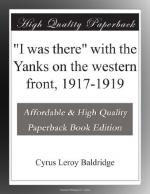“Not so hasty, Shama-ben-Elkanah. You also break the law by judging a man unheard. The rabbis have told us that there is a tradition of the elders-a rule as holy as the law itself-that a man may deny his father in a certain way without sin. It is a strange rule, and it must be very holy or it would not be so strange. But this is the teaching of the elders: a son may say of anything for which his father asks him-a sheep, or a measure of corn, or a field, or a purse of silver-’it is Corban, a gift that I have vowed unto the Lord;’ and so his father shall have no more claim upon him. Have you said ‘Corban’ to your father, Ammiel-ben-Jochanan? Have you made a vow unto the Lord?”
“I have said ‘Corban,’” answered Ammiel, lifting his face, still shadowed by that strange smile, “but it was not the Lord who heard my vow.”
“Tell us what you have done,” said the old man sternly, “for we will neither judge you, nor shelter you, unless we hear your story.”
“There is nothing in it,” replied Ammiel indifferently. “It is an old story. But if you are curious you shall hear it. Afterward you shall deal with me as you will.”
So the shepherds, wrapped in their warm cloaks, sat listening with grave faces and watchful, unsearchable eyes, while Ammiel in his tattered silk sat by the sinking fire of thorns and told his tale with a voice that had no room for hope or fear-a cool, dead voice that spoke only of things ended.
II.
NIGHTFIRE
“In my father’s house I was the second son. My brother was honored and trusted in all things. He was a prudent man and profitable to the household. All that he counselled was done, all that he wished he had. My place was a narrow one. There was neither honor nor joy in it, for it was filled with daily tasks and rebukes. No one cared for me. My mother sometimes wept when I was rebuked. Perhaps she was disappointed in me. But she had no power to make things better. I felt that I was a beast of burden, fed only in order that I might be useful; and the dull life irked me like an ill-fitting harness. There was nothing in it.
“I went to my father and claimed my share of the inheritance. He was rich. He gave it to me. It did not impoverish him and it made me free. I said to him ‘Corban,’ and shook the dust of Bethsaida from my feet.
“I went out to look for mirth and love and joy and all that is pleasant to the eyes and sweet to the taste. If a god made me, thought I, he made me to live, and the pride of life was strong in my heart and in my flesh. My vow was offered to that well-known god. I served him in Jerusalem, in Alexandria, in Rome, for his altars are everywhere and men worship him openly or in secret.
“My money and youth made me welcome to his followers, and I spent them both freely as if they could never come to an end. I clothed myself in purple and fine linen and fared sumptuously every day. The wine of Cyprus and the dishes of Egypt and Syria were on my table. My dwelling was crowded with merry guests. They came for what I gave them. Their faces were hungry and their soft touch was like the clinging of leeches. To them I was nothing but money and youth; no longer a beast of burden-a beast of pleasure. There was nothing in it.




